Content warning: This article discusses mental health and fatphobia.
Hundreds of people took to the streets of Tāmaki Makaurau and Pōneke last weekend, calling for adequate access to healthcare and equity for trans and takatāpui folk.
In Auckland, organiser Caeden Tipler started the protest with a karakia and dedicated it to people they had lost in their community.
It was also about demanding better for the trans community, the 17-year-old said.
Thousands of New Zealanders need gender-affirming surgeries but the public health system is struggling to meet these needs.
This has led to many trans people in Aotearoa feeling distressed and experiencing high levels of hardship as they go to great lengths to get their healthcare.
Re: News contributor and photojournalist Vivien Beduya went to the march and asked protesters why it was important to be there.
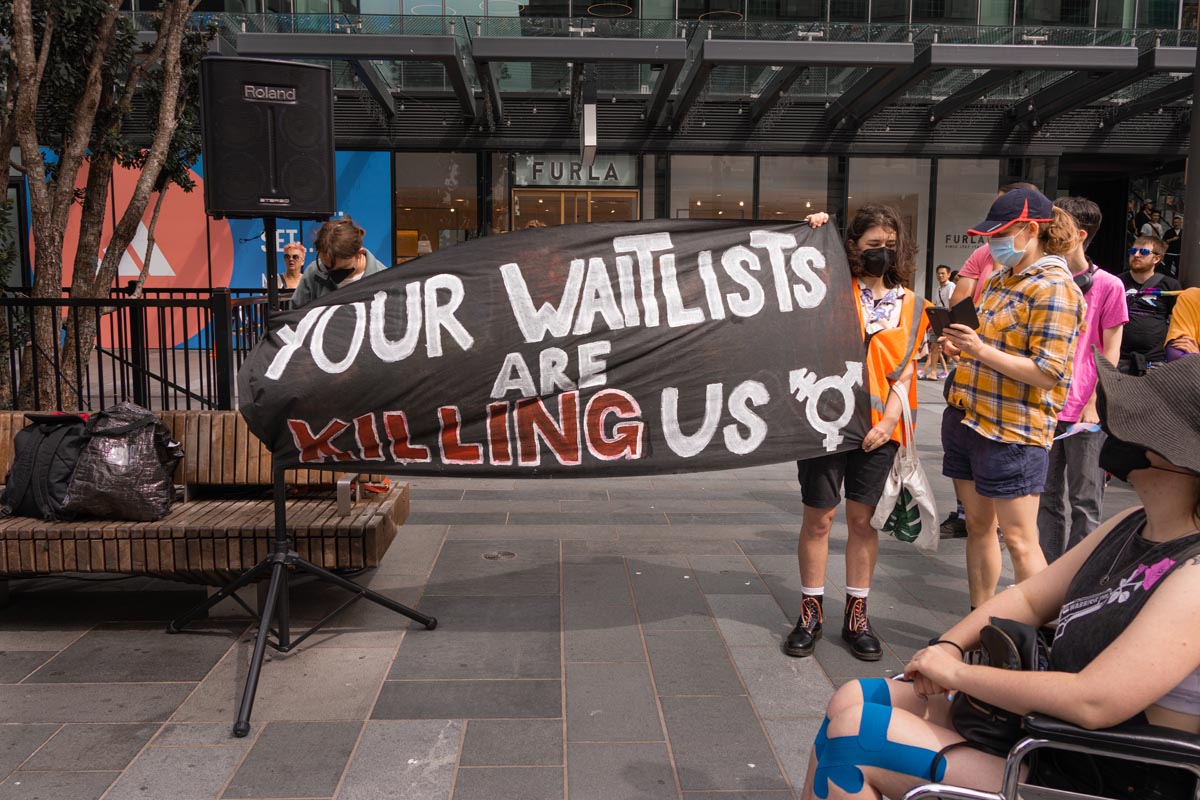
A banner that says “Your waitlists are killing us” was held up during the speeches.
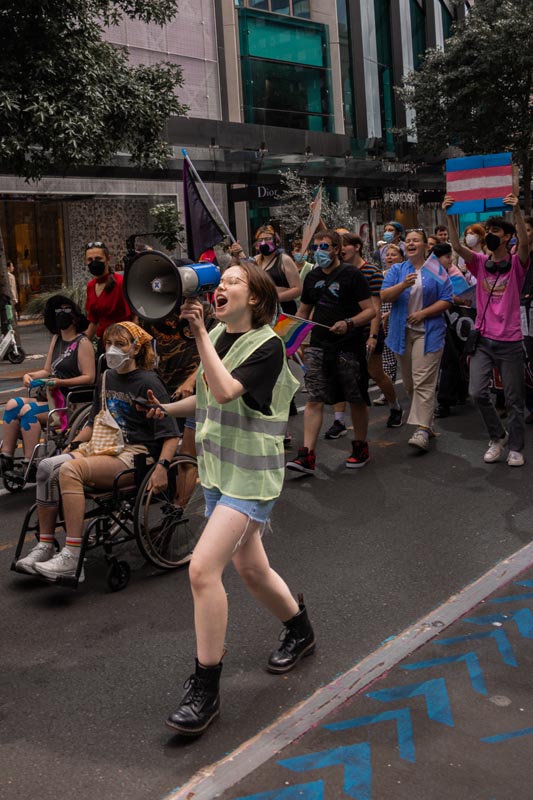
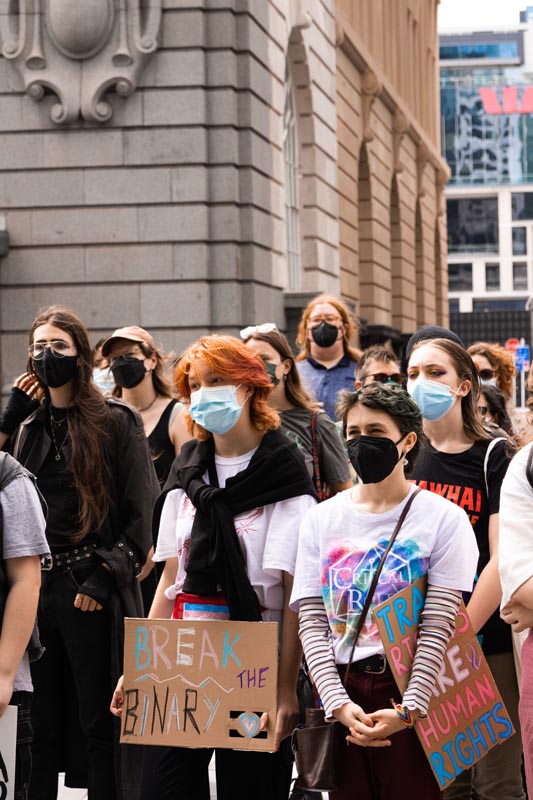
(Left) Caeden Tipler at the march, enthusiastically leading the chant “trans rights saves lives”.
(Right) Protesters gathered in Te Komititanga as they listened intently to the guest speakers.
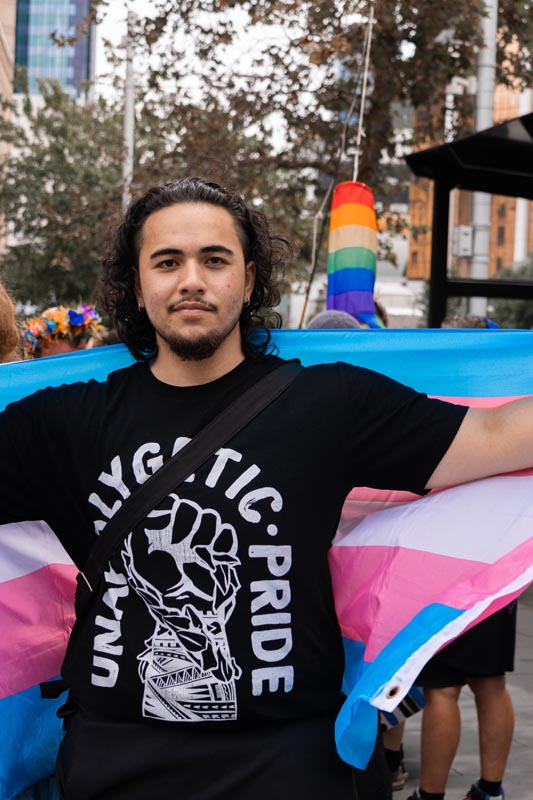
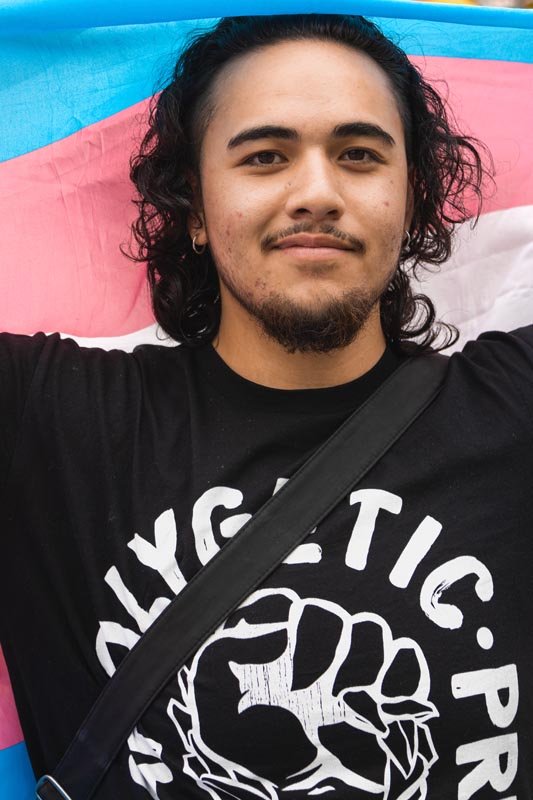
Flo Akauola, 18, he/him/they/them
Why is it important for you to be here?
“I’m not only representing the fact that I am transgender but I’m also representing my Polynesian community. Our polynesian people are highly under-resourced in terms of knowledge, access and affordability of trans healthcare.
“And what I want people to know is that trans health care is health care, and a lot of our people aren’t able to access this for many reasons.
“We need to make sure everybody has accessibility, because not only are we saving lives, but we are saving families too because we don’t want to lose any more people.”
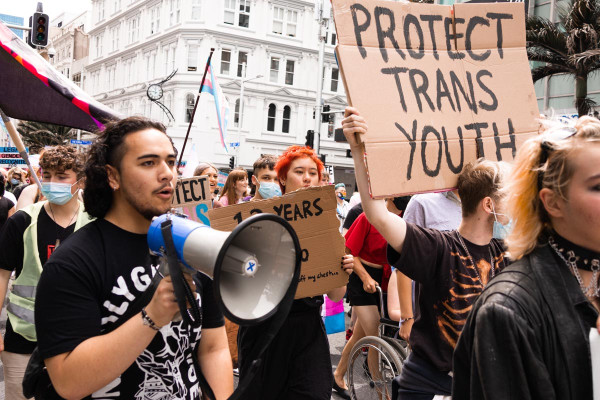
Flo was in front of the protest holding the megaphone to help with their rally cry “trans rights save lives!”
What do you want people to understand about trans health care?
“The system that has been set up is not working and there needs to be changes. I myself have many barriers to health care, and there are people who will never be able to access health care.
“And there are people who are not here today living because of this reason.
“So I think that people need to understand that everyone deserves health and wellness.
“This march here and every moment moving forward, we need to be working towards equitable, affordable and accessible trans gender-affirming health care.”
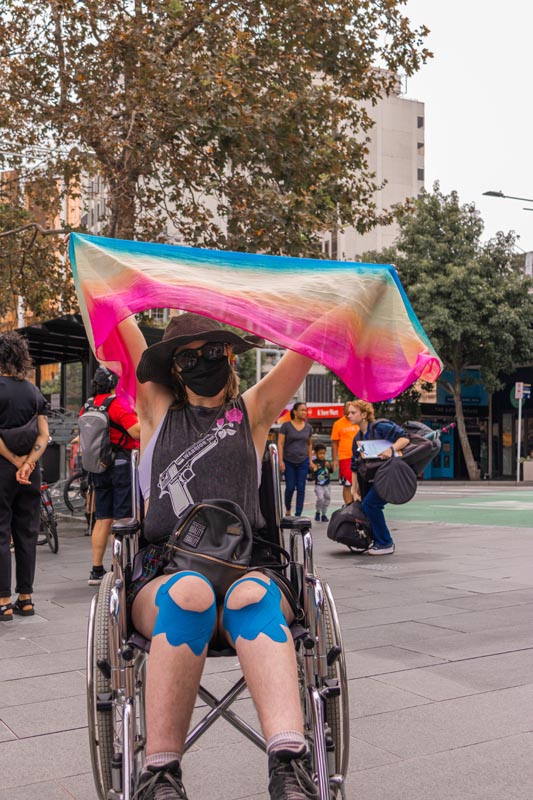
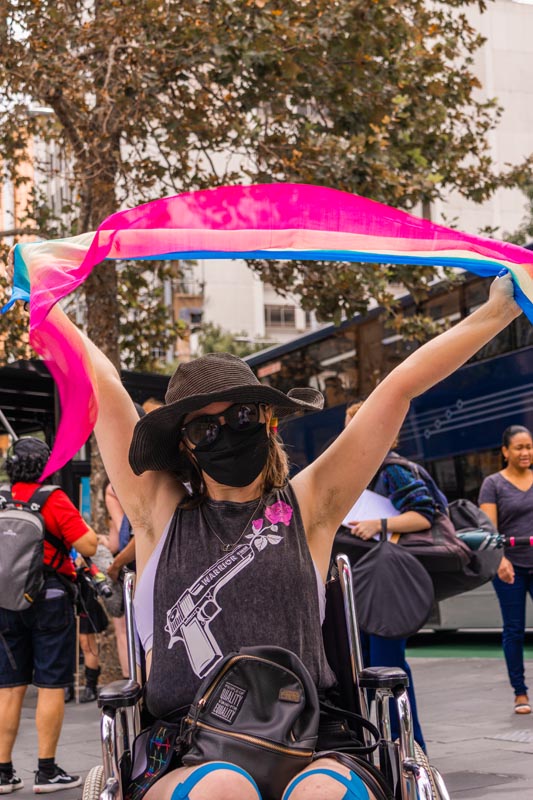
Rachel Childs, 25, she/her/they/them
Why is it important for you to be here?
“It affects the people I love, like my closest friends. It’s seeing the struggle they’ve gone through.
“While I’m LGBT, I’m more or less, cis, and so it’s important for them to have allies who won’t speak for or over them, but instead advocate for people to listen to their stories and believe them. That’s something I can do and will do. Because it nearly cost me some of my closest friends and I will not have that happen to anyone else.”
What do you want people to understand about trans health care?
“For so long in history, we’ve been told that there are only two boxes. And that is male or female, and anyone else in between, there is none.
“But so many indigenous peoples, and so many of our earliest myths, mention an intersex person made by one of the most powerful goddesses in their pantheon.
“We have always existed and it’s not that we are suddenly appearing, or that it’s a trend, or that it’s something popular.
“It's the first time in thousands of years that we are comfortable being out and open.
“It’s not that we were never here before, it’s that we were hidden for our own safety. And we will not and cannot hide any longer.
“Too many of us are dying because of it.”
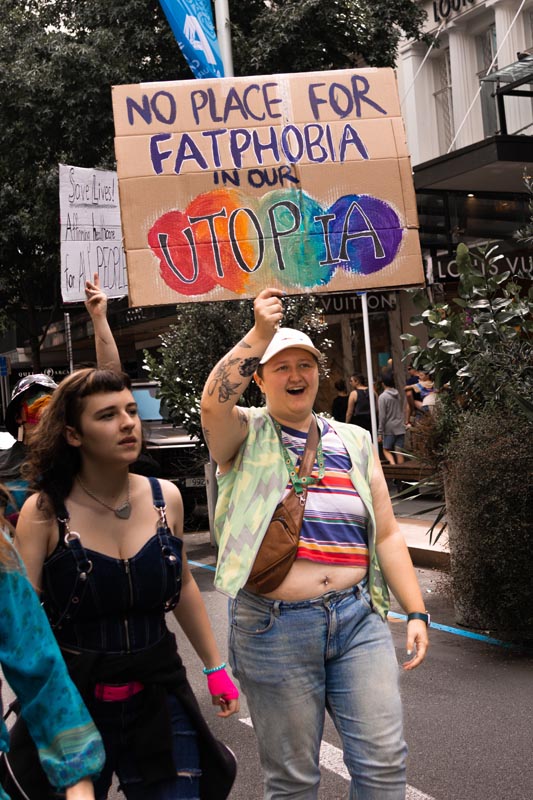
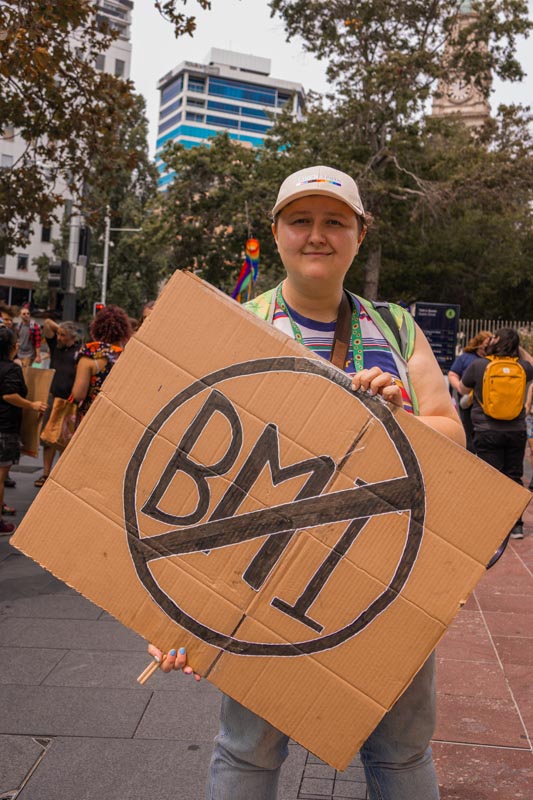
Alika Wells, 28, (they/them)
Why is it important for you to be here?
“It’s important for me to be here first of all as a trans person who has the privilege to be Pākeha in this country.
“[I am] showing up for my fellow trans whānau, for our takatāpui whānau, and also to be bringing attention to the weight stigma within our medical sector at the moment.”
What do you want people to understand about trans health care?
“Trans health care is varied, it isn’t one thing. Different people want different things, and some people don’t want anything.
“It doesn’t make them less trans. But the key thing is that gender-affirming care is life saving care, it is crucial. It should be free and accessible - regardless of your whakapapa, or who you are, where you come from or how fat you are.”
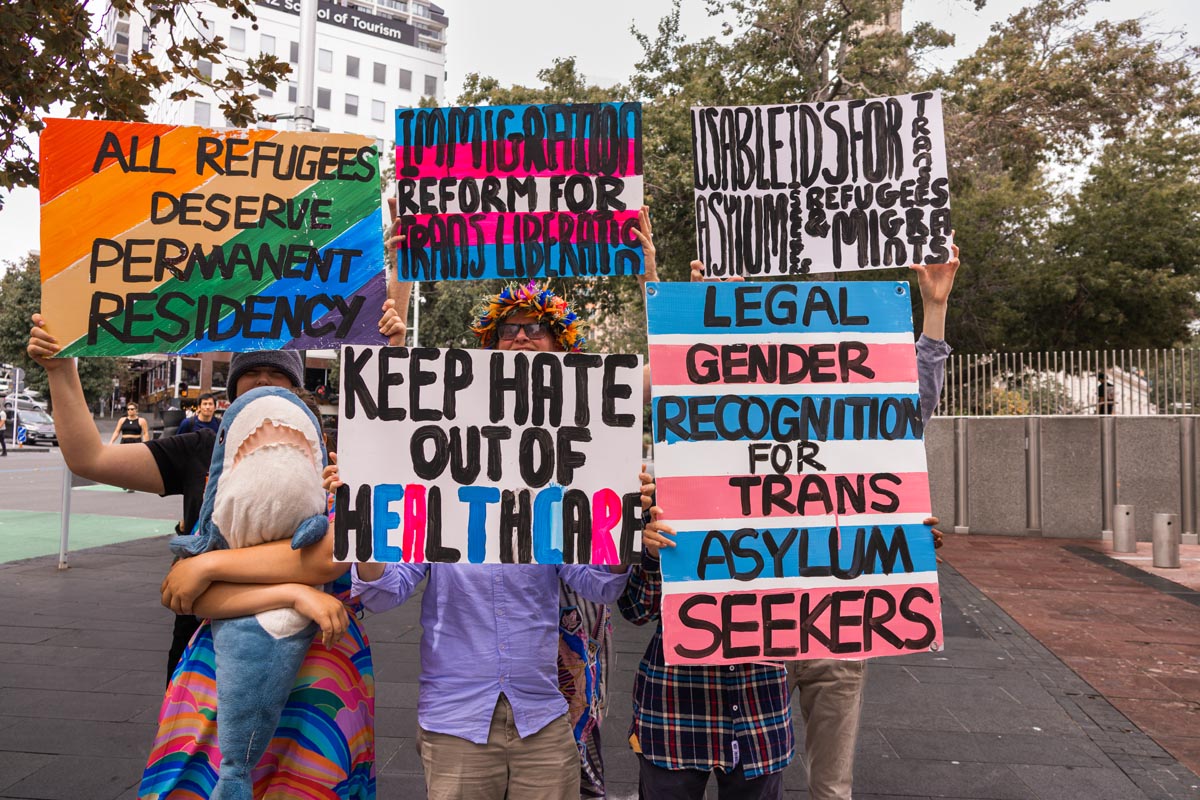
The Rainbow Path representatives, a peer support group for Rainbow refugees and asylum seekers, with their friends and allies at the protest.
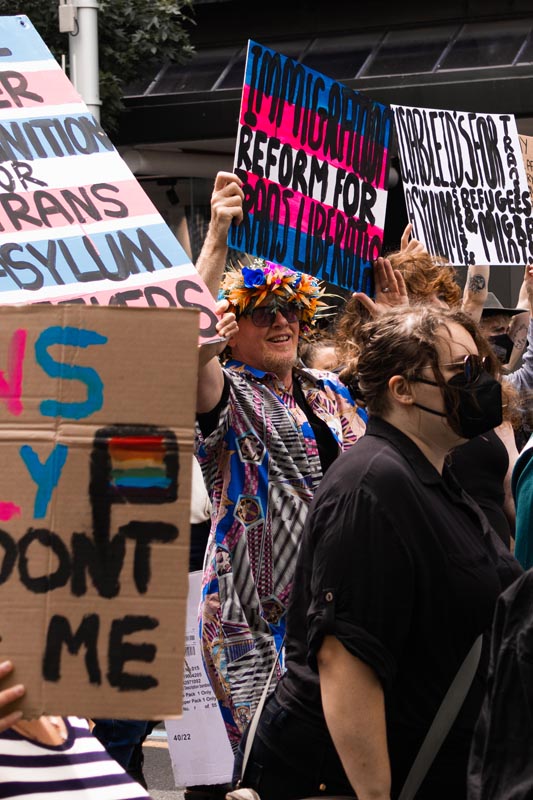
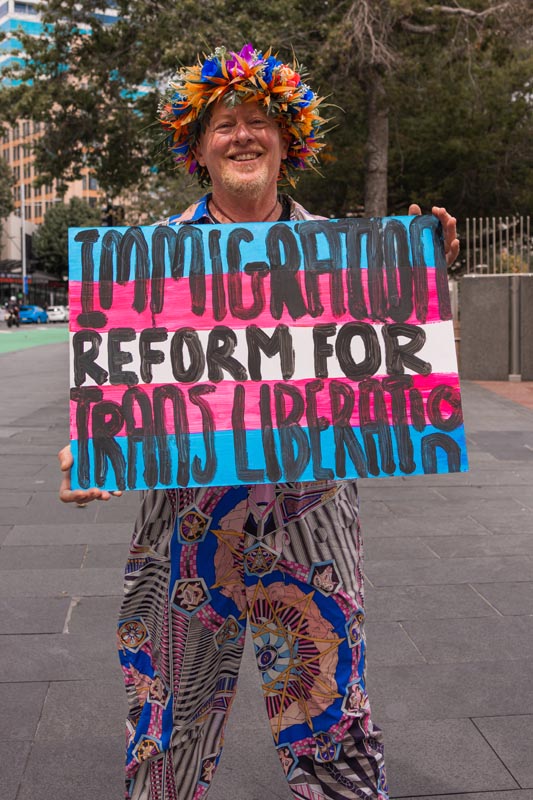
Jack Byrne, 60, he/him
“I’m a human rights researcher. [We know from our research] that there is an unmet need for all types of gender-affirming healthcare.
“I’m here partly because it’s great seeing young people from our community organise a protest, and march, and to have a celebration for who we are.
“Trans people have been fighting for access to gender-affirming care for a long time.
“My first march was about 2003, so that’s about 20 years ago. There are a lot of people who have fought before that. It’s just wonderful to see people still fighting, but it’s also sad to see how little progress we’ve made.”
In the 20 years that have passed, what changes have you seen?
“There’s a lot more visibility now compared to what there was 20 years ago.
“But there’s a lot more opposition and misinformation. So it’s still really difficult for people and there’s a lot more attacks against trans people’s rights.
“We were largely invisible before and now we have people actively campaigning against our rights.
“So what’s really important is that those people who support us and think it’s fine to be quiet, to realise these are one of those important turning points.
“[We could] get a critical mass of people saying this is just about the same human rights that everyone else has including the right to [an] adequate standard of health care.”
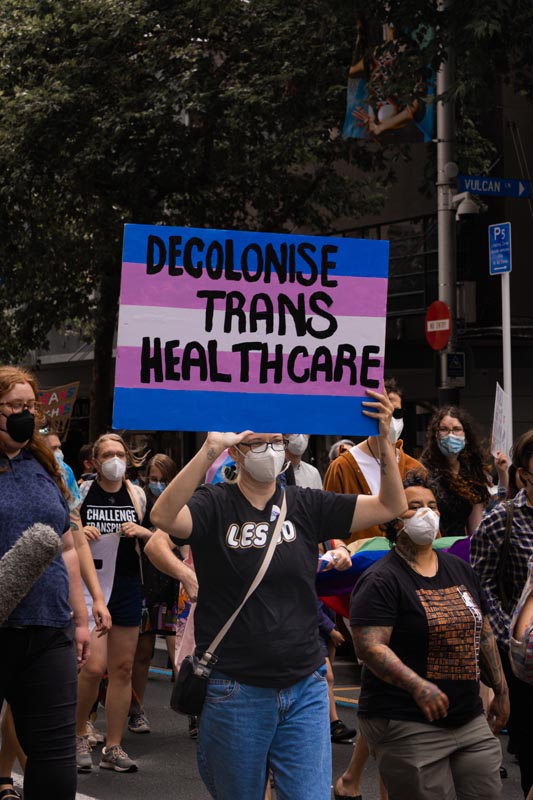
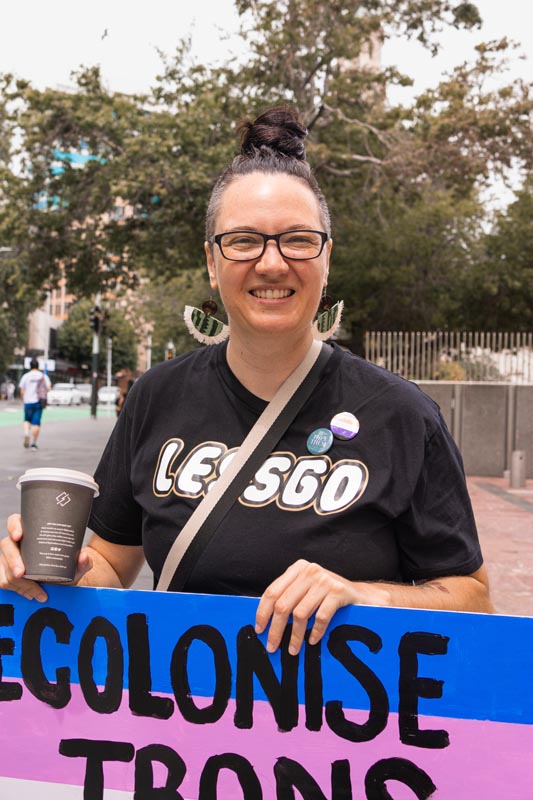
Leilani Thompson-Rikys, 44, they/them
“There’s just so many gaps in trans health care at the moment. I work for OutLine as a trans and nonbinary peer support coordinator. Through that, I’ve seen people really affected by the gaps.
“There’s a lot of arbitrary problems with the healthcare system. Like for example, often to access hormones, you need a psychologist assessment to access it.
“The wait for top-surgery is a very long wait. It’s just really hard and I see a lot of the pain and suffering that people are going through for not being able to access the health care they need.”
What’s so important about your sign?
“My ancestors come from Fiji, Tonga and the UK and my ancestors were able to be gender diverse and it was something that was celebrated. This was taken away by colonisation.
“For Māori and Pasifika communities, they have really been impacted by the colonial health system which saw being transgender as something that needed to be cured initially.
“And now it has changed but it’s still held up by those problems. You shouldn’t need a diagnosis to be seen as trans. You can kind of see that the system sets people up to fail.”
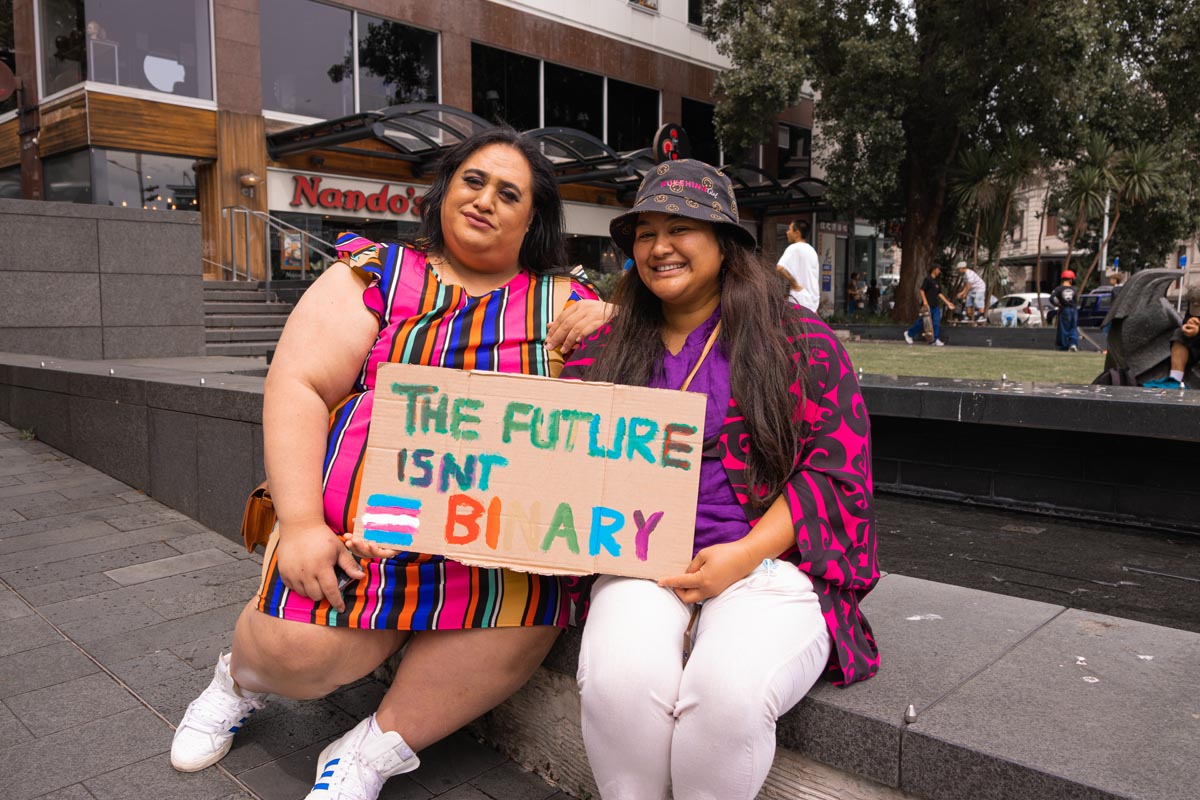
Brady Peeti, 34 (she/her) and Tamara Poi, 33 (she/her)
Tamara:
“I’m an ally and here to support our rainbow community and our takatāpui trans, and I’m here to support trans health care rights.”
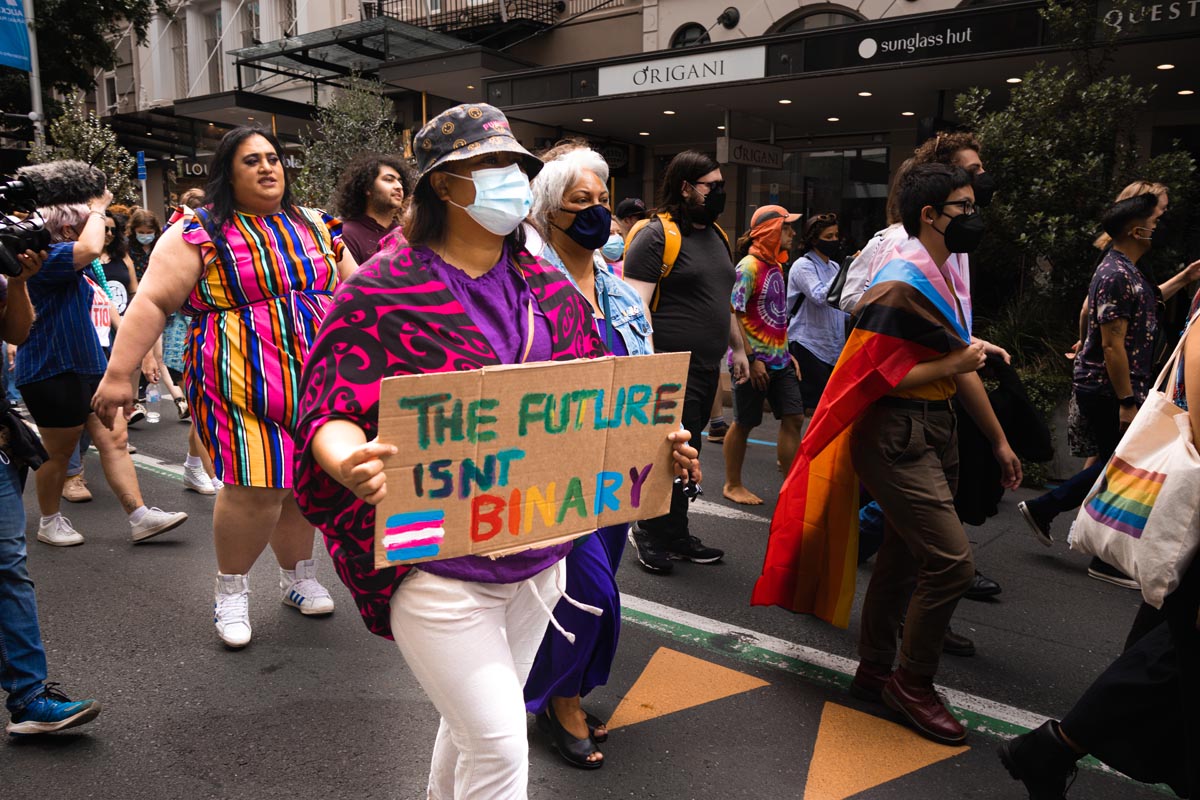
Brady and Tamara marching together.
“I was gifted this [sign] and I absolutely believe in the message. The future isn’t binary. We need to be more open and accepting of everyone as they are authentically.”
Brady:
“I’m marching in solidarity with my whānau, standing up for our rights to receive the proper health care. Our youth are angry and they have every right to be.
“It’s exciting to see that we have strong hands once we move over and they come to the forefront.
“It was beautiful to come watch and receive all of that.”
More photos from the protest:
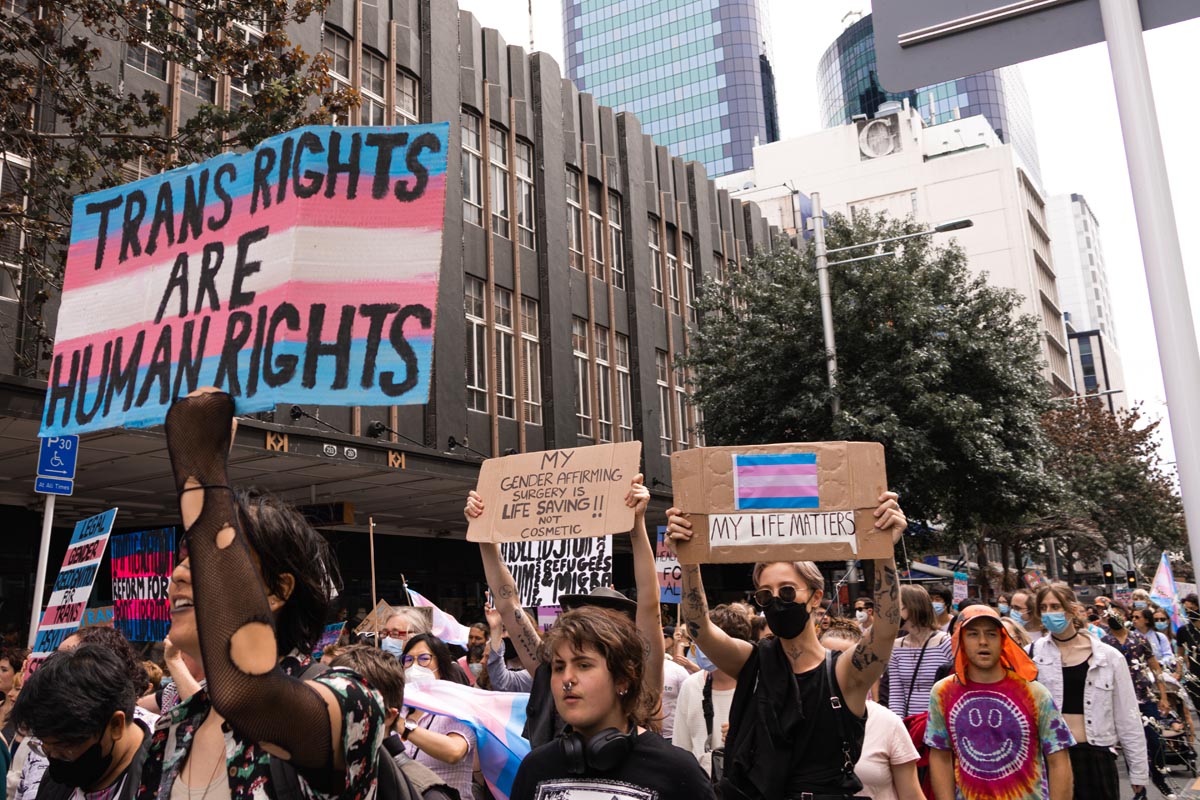
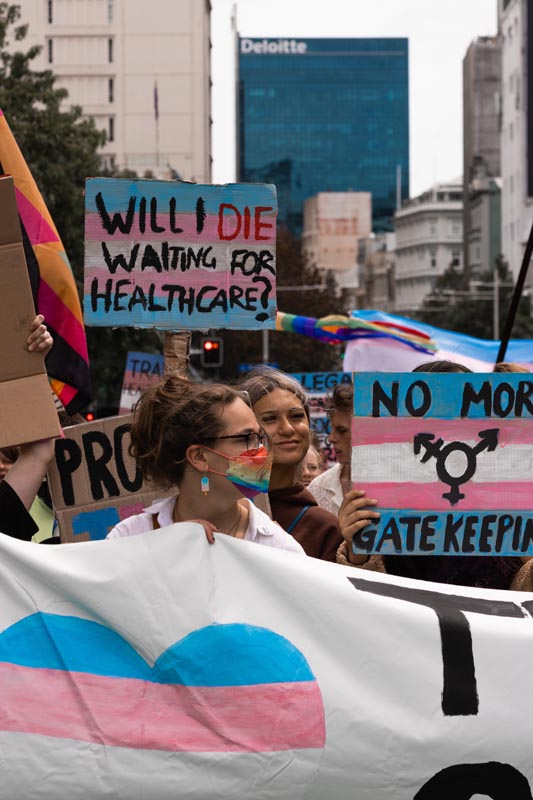
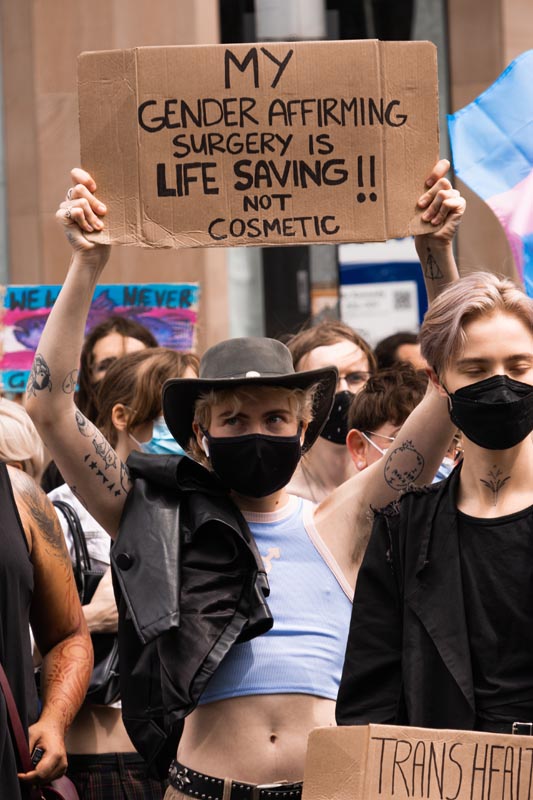
Where to get help:
- 1737: The nationwide, 24/7 mental health support line. Call or text 1737 to speak to a trained counsellor.
- Suicide Crisis Line: Free call 0508 TAUTOKO or 0508 828 865. Nationwide 24/7 support line operated by experienced counsellors with advanced suicide prevention training.
- Youthline: Free call 0800 376 633, free text 234. Nationwide service focused on supporting young people.
- OUTLine NZ: Freephone 0800 OUTLINE (0800 688 5463). National service that helps LGBTIQ+ New Zealanders access support, information and a sense of community.
All photos by Vivien Beduya.
More stories:
I’m getting top surgery to finally feel comfortable in my body
“It’s just not me. It’s just not right. I can’t explain it.”
NZ’s public health system is failing trans people
Thousands of NZers need gender-affirming chest surgeries. The Govt provided 10 in 2021.
I’m 16: Why do I need my mum’s permission to change my name
“We have autonomy except in this area.”